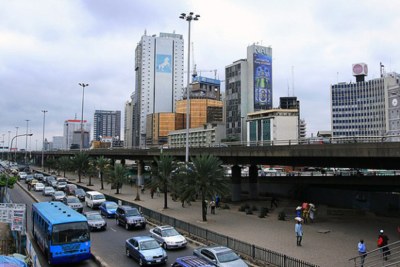-
Nigeria: Road Surface Asphalt Can Pollute Soils - We Checked the Health Risk in a Nigerian City
The Conversation Africa, 9 August 2021
Nigeria has about 195,000km of road network, including about 60,000km of paved surfaces. The demand for road construction and highway expansion in Nigeria has led to an increase in… Read more »
-
Nigeria: $430 Million Enugu-Cameroon Highway Project to Be Completed This Year - AfDB
Premium Times, 21 June 2021
The bank's president said that the highway would link 85 percent of the trade volume in ECOWAS through the corridor. Read more »
-
Nigeria: Govt to Concession 12 Roads Under New Highway Initiative
This Day, 2 February 2021
The Minister of Works and Housing, Mr. Babatunde Fashola, has said with the receipt of certificate of compliance, the federal government is now set to officially commence the… Read more »
-
Nigeria: Network Rejects Govt 'Outrageous' Road Construction Contracts
Daily Trust, 8 March 2021
The Anti-Corruption Network (ACN) has called for an independent scrutiny of the recent road construction contracts awarded by the Federal Executive Council (FEC), saying the… Read more »
-
Nigeria: Driving the Tree Planting Initiative
This Day, 12 April 2021
Firm proponents of the need to save the planet, the STEAM club members of Caleb British International School, comprising year seven to Year 11 students, have been driving a tree… Read more »
Is Road Surface Asphalt Posing Health Risk to Nigerians?
Hot mix asphalt, used mainly for road construction, is produced by mixing aggregates -- gravel, crushed stones, rock dust or powder - with bitumen under high-temperature conditions. This is done using an assembly of mechanical equipment in a plant - a facility which may be a temporary or permanent structure. These asphalt production plants are sometimes located within residential areas for convenience and proximity to construction sites.
Emissions from hot mix asphalt and other plant operations, such as heating of aggregates and bitumen, loading and transportation of materials, as well as vehicle and facility maintenance, introduce various contaminants, like heavy metals, into the environment. The demand for road construction and highway expansion in Nigeria has led to an increase in the number of asphalt production plants in the country. Aggregates used for asphalt production have varying concentrations of heavy metals. Some of these metals may escape from the aggregates and bitumen during asphalt production into the surrounding soil and water sources, writes Ifenna Ilechukwu for The Conversation.
InFocus
-
The government has selected four asset managers to run the U.S.$37 billion funds set up to drive investment in roads, railways, and power projects in Nigeria. The ... Read more »





